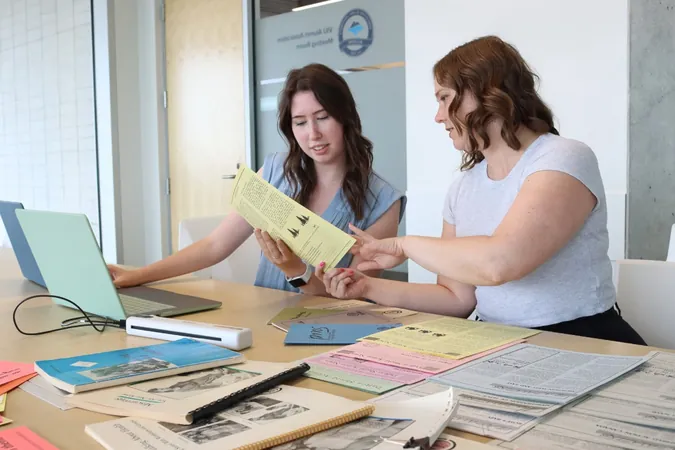
Unearthing the Past: How a Vancouver Island University Project is Transforming Women's Health Perspectives
2024-12-15
Author: Charlotte
Introduction
In an ambitious effort to illuminate the historical context of women's health issues, researchers at Vancouver Island University (VIU) are meticulously archiving documents pertaining to pelvic health conditions. This initiative, spearheaded by Whitney Wood, VIU’s Canada Research Chair specializing in the historical dimensions of women's health, aims to address a critical gap in medical research and patient care.
Focusing Beyond Reproductive Health
Wood highlights that most studies on women's pelvic health tend to be overly focused on reproductive health. This narrow view leaves significant gaps for many women, non-binary, and gender-diverse individuals suffering from often overlooked and 'invisible' conditions such as endometriosis, chronic pelvic pain, menstrual disorders, yeast infections, and urinary tract infections.
Historical Context in Contemporary Health Challenges
"Every one of our contemporary health challenges—whether they be care insufficiencies, health disparities, or inequities we encounter in 2024—are inherently rooted in our historical context," Wood explained. "It's essential to understand that these gaps didn’t arise by chance; they’ve been systematically shaped by historical decisions. Acknowledging the past is crucial for crafting a more equitable health system for all Canadians moving forward."
Archival Project Scope and Methodology
The archival project, which focuses on materials from 1970 to 2000, includes resources from prominent women’s health organizations like the Vancouver Women’s Health Collective, along with medical journals, magazines, and newspapers. By employing cutting-edge optical character recognition technology, the team transforms these historical documents into searchable text formats, allowing for efficient keyword research.
Future Steps: Incorporating Oral Histories
In an exciting next step, the research team plans to incorporate oral history interviews in the upcoming year. "We are keen to engage with individuals who were active in health advocacy during the late 20th century, as well as those who have experienced pelvic health challenges firsthand," Wood remarked.
Impact on Contemporary Practices
Wood envisions that once this comprehensive archive is finalized, practitioners and clinicians, particularly those involved in gynecological care, will mine these historical insights to inform their current practices. "We aim to bridge the past with the present, drawing lessons that can empower modern health care strategies," she stated.
The Role of the Vancouver Women’s Health Collective
The Vancouver Women’s Health Collective (VWHC), established in the early 1970s, stands out as a pioneer in feminist health activism. Wood discovered in her archival work the extensive range of issues that the collective championed, which extended far beyond gynecological care or reproductive rights. "From safe gynecological care, abortion access, and reliable contraception to broader social elements like safe housing and domestic violence prevention, these activists were attuned to the 'social determinants of health' long before they became mainstream terms in contemporary discourse," she noted.
Commitment to Accessibility
In a major show of commitment to accessibility, the archive is set to be made publicly available in the coming months through the Rise Up Feminist Digital Archive, ensuring that anyone interested can delve into this rich resource. This project has received funding through a Canadian Institutes of Health Research grant, further emphasizing its importance in contemporary discussions about health care equity.
Conclusion
Ultimately, Wood emphasizes a crucial takeaway from this endeavor: the imperative of listening to and valuing the experiences and voices of women and gender-diverse populations in health care settings. "These groups have been raising awareness of their health needs for over five decades. It’s high time these voices are not just heard, but actively integrated into shaping health care practices," she concluded.
Looking Forward
As this transformative project unfolds, it promises to reshape the conversation around women's health in Canada and beyond, reaffirming the necessity of a historical perspective in modern medical research and practice.









 Brasil (PT)
Brasil (PT)
 Canada (EN)
Canada (EN)
 Chile (ES)
Chile (ES)
 España (ES)
España (ES)
 France (FR)
France (FR)
 Hong Kong (EN)
Hong Kong (EN)
 Italia (IT)
Italia (IT)
 日本 (JA)
日本 (JA)
 Magyarország (HU)
Magyarország (HU)
 Norge (NO)
Norge (NO)
 Polska (PL)
Polska (PL)
 Schweiz (DE)
Schweiz (DE)
 Singapore (EN)
Singapore (EN)
 Sverige (SV)
Sverige (SV)
 Suomi (FI)
Suomi (FI)
 Türkiye (TR)
Türkiye (TR)